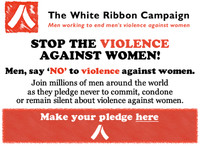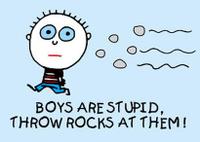***
Why I shall [try to] wear a Black Ribbon on Wednesday (25th November) - on a Campaign against Male-on-Female Violence
The White Ribbon Campaign

November 25th is "The International Day for the Elimination of Violence against Women". In conjunction with this, AWARE is promoting the "White Ribbon Campaign" (WHC; started by some Candians) which is about "Men working to end men's violence against women". Men are asked to make "a personal pledge to never commit, condone or remain silent about violence against women and girls", and asked to proclaim that "our future has no violence against women".
While on the surface of it this is a worthy cause, it does not take deep analysis to realise that this campaign is deeply problematic.
With the emphasis on men's violence against women, this campaign discursively reinforces the stereotype of men as iniquitous aggressors and women as helpless victims and threatens to replace the complex picture violence between and within genders with a simplistic view.
Of course, it is true that probably the majority of violence suffered by women is inflicted by men, but then the primary victims of male violence are other men. This is to say nothing of female-female and female-male violence - especially since the WHC's definition of "violence" is more than meets the eye. Indeed, it has been suggested that "Men create more damage, but women hit more than men do".
Even if it were true that the bulk of violence was directed at women by men, one is put in mind of the objections raised to this line of Singapore's Constitution: "Except as expressly authorized by this Constitution, there shall be no discrimination against citizens of Singapore on the ground only of religion, race, descent or place of birth in any law". The phrasing of this line, as well as the word "only" is very important as some implications seem to be that:
i) One can discriminate against non-citizens
ii) One can discriminate based on other factors like sexual orientation, language and political affiliation.
iii) If the Constitution authorizes it, you can discriminate against - in law - citizens based on religion, race, descent or place of birth.
Similar principles apply for the WHC; if you think that stereotypes in general are necessarily bad (as the people behind and supporting the WHC surely do), surely you should also think that a campaign that encourages stereotypes (even if unwittingly) is also bad.
Physical Violence
The WHC says that "violence against women takes many forms", including "Physical violence against spouses and girlfriends - from hitting right up to murder".
I'm sure that we can all agree that murdering another person (even if your target is not a female, and you are not a male) is wrong, and so too is anything that might constitute cruel and unusual punishment. Yet, "hitting" is a potentially broad term that could encompass many forms of physical activity, from bashing with a cudgel to punching with fists to slapping with the palm.

Now, there're many people who will say that a man should never hurt a woman - but most of these would cheerfully go on to endorse women slapping men, or perhaps even hitting them in the groin (many of them while mocking the man's sexuality). Indeed, when women engage in physical violence against men, most people assume the man must've done something wrong and thus deserves it. This view probably comes about from men being seen as subjects and aggressors, and women as objects and victims. If an aggressor is the victim of his erstwhile victim's aggression, he must have deserved it as he was violent himself, and for an object to turn on its subject would be like an ass mounting a lion.

Furthermore, hitting can also be playful, low-intensity and/or not unwarranted. Sometimes you can see girls pulling their (presumed) significant others around by the ears - this potentially falls into some or all of these categories, yet if all forms of hitting are considered undesirable forms of "physical violence", this behavior would surely qualify too.
Consider too that many parents hit children to discipline them. Going after your child with a hot iron is definitely child abuse, but mild slapping or hitting is probably not.

A definition of unacceptable hitting thus has to include criteria of intensity, duration, regularity and provocation; in short, you shouldn't hit people hard, many times, often and when they've done nothing wrong.
Sexual Violence
The second category is "Sexual violence - usually committed by a boyfriend, husband, trusted adult, or family member". I don't have too much to say on this aspect in particular, at least based on the poster, except that it has been reported that reports of women carrying out sex attacks on children have soared in the last five years, and it is clear that this is because men are pigeonholed as sexual aggressors whereas women are sexual victims. I will also note that date rape is another problematic concept.
Emotional
Although the WHC calls this "Emotional Abuse", the fact that this is a campaign about Violence leaves us in no doubt over what "Emotional Abuse" is considered.
The WHC defines "Emotional Abuse" as "sexual harassment at work or on the street, stalking, jokes that demean women, and controlling behaviour". While stalking and sexual harassment (once flirting has clearly been made unwelcome) should be unreservedly condemned, controlling behaviour is very much more contestable a term. The fact is that we control other people's behavior all the time. For example, a woman might refuse to cook her boyfriend his favourite dish until he fixes the plumbing. Again, similar to hitting, a working definition of "controlling behaviour" has to include criteria of intensity, regularity, complicity and reasonableness. In other words, in the example above, we would not sensibly call this "controlling behaviour" if the woman did not lock her boyfriend out of the house, it only happened occasionally, the man sighed and went "yes, dear" with a half-smile and the damaged plumbing was causing the bathtub to leak.
"Jokes that demean women" is an even more contentious category. Presumably any joke which made women its butt would qualify (i.e. a sexist joke - or at least one with women as the object of humour).
Yet, to proscribe an entire genre of jokes would reduce the possibilities for human interaction - even with and between women (just as Malays do tell Malay jokes and Christians do tell Christian jokes, women do tell sexist jokes - and not just those excoriating men). Extending this principle, most jokes would have to be canned, since I cannot think of a joke that is not a pun that won't offend -somebody-.
This is not to mention the evils of censorship (if harm was a sufficient criterion for censorship, the first idea to be censored for hurting women would be... feminism). Furthermore, humor is always based on a modicum of truth. For example, have you ever heard a joke about a father-in-law? And no, blaming patriarchy doesn't cut it.
Even if you wanted to say that sexist jokes (against women) were not very nice, it would be a stretch to call them "emotional abuse" and thus "violence". It makes as much sense as calling all abortion murder, and legalised abortion a genocide. As a friend of mine commented, "i am a woman. I crack jokes about myself and other women. Does that fall under self-harm?"
One might also point out the double standard that people hardly bat an eye at jokes (or statements) that demean men. As a common T-shirt reads, "Men are like lava lamps. Nice to look at, but not very bright". Also, statements that are often thrown around to encourage women usually do it at the expense of denigrating men. Some classics of the genre:
- "A woman has to work twice as hard as a man to be thought of as half as good. Luckily this is not difficult"
- "Anything boys can do, girls can do better"
- "Boys are stupid, throw rocks at them!"

As Warren Farrell notes, "in the past quarter century, we exposed biases against other races and called it racism, and we exposed biases against women and called it sexism. Biases against men we call humor". The point not being that we cannot make any jokes, but that we should lighten up and stop getting offended over every little thing.
Furthermore, sexist jokes are the least of women's problems. A man asking a woman to lose weight would piss her off/"emotionally 'abuse' her" more than if he told her a sexist joke. Yet, if you want to look at "emotional abuse", the top perpetrators of emotional abuse against women... are other women - who are more socially aggressive than men; "evaluations of the promiscuity of other women" are certainly extremely hurtful to women (seeing as how no woman wants to be called a "slut"). Slimming ads could similarly be seen as structuralised gender-based violence. Does it really make sense, then, fingering men for this? As H. L. Mencken observed, a misogynist is "A man who hates women as much as women hate one another".

With regard to "jokes that demean women", the proverbial case of the boy who cried about a splinter in his finger while his house burnt down comes to mind.
I might perhaps be accused of being uncharitable in interpreting the WHC's intentions in an unreasonable way. Yet, in a world full of double-speak where racial discrimination against certain races is not considered racism (in the same way that killing Jews was not considered genocide because they were sub-human) and where "not sending girls to school" is considered "gender-based violence". And with the classification of sexist jokes as "emotional abuse" which, in turn, is called "violence", this is surely not an invalid concern.
Female genital mutilation/sex trafficking
Here, I will just note that not all forms of female genital mutilation (female circumcision) are created equal - the reality is more complex. I will also note that male genital mutilation, on the other hand, is ignored - nay, socially sanctioned, and even celebrated in many quarters.
In all...
I'm sure I would find a lot more disturbing material if I looked at the The White Ribbon Campaign's website, but time (and the attention span of readers) is limited, so the above should suffice.
One wonders if a campaign targeting men and focusing on male-on-female violence has many more merits than a campaign targeting anybody condemning violence against anyone. I would be less uncomfortable with an effort by the world of men to end violence (period), or an effort (period) to end violence (period) against women, but the combination narrows the scope far too much.
In some cases, a targeted approach might make more sense than a general one. For example, "working with Malay and Muslim organisations to spread the anti-drugs message to Malay youths" seems to have been very effective in reducing drug abuse in the Malay community in Singapore (but do note that this was against the backdrop of a strong anti-drug message targetted at the entire population). Yet, I do not see how this might apply with the WHC.
In short, a much better campaign would be about "people working to end violence against other people", with people being asked to make "a personal pledge to never commit, condone or remain silent about violence against anyone", and asked to proclaim that "our future has no violence against other human beings".
I will thus look for a black ribbon to wear tomorrow, to express my condemning of violence against people, and disapproval of sexist, unreasonable campaigns.



